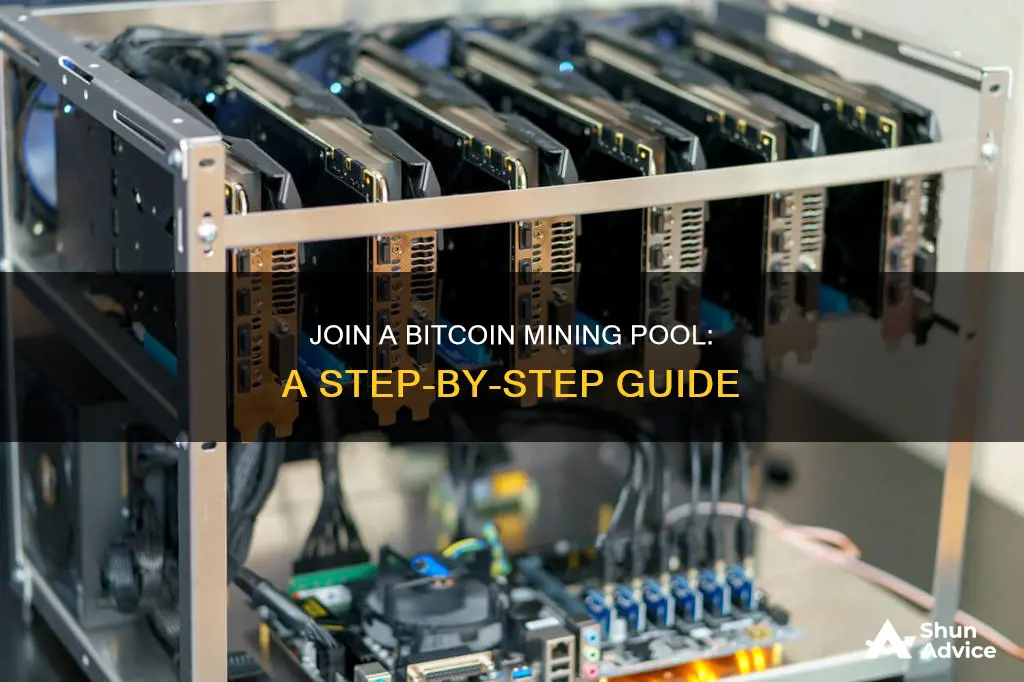
Bitcoin mining is a process that uses highly specialised computers to verify transactions on the Bitcoin blockchain. These computers solve complex mathematical equations, and the first computer to solve the problem is rewarded with Bitcoin. The process is similar to how central banks create money, but unlike banks and fiat currencies, there is a cap of 21 million on the total number of Bitcoins that will ever exist.
Mining Bitcoin requires a significant investment in hardware and storage facilities. To reduce the financial burden, some investors opt to join a Bitcoin mining pool, where a group of miners pool their collective hashrates to increase profits. In a mining pool, each miner provides a percentage of the pool's computing power and is rewarded with an equivalent percentage of Bitcoin when the pool verifies a transaction.
Cloud mining is an evolution of the mining pool concept, where data centres rent out their hash power to individuals who want to mine Bitcoin but lack the necessary equipment. Cloud mining eliminates the need for individuals to purchase and maintain expensive mining rigs, and it also reduces electricity-related concerns. However, it is important to be cautious when investing in cloud mining due to the presence of scams and fraudulent pools.
| Characteristics | Values |
|---|---|
| Investment Type | Bitcoin mining pools are a group of computers that work together to verify Bitcoin transactions. |
| How It Works | All the computers in a mining pool combine their computing power to help verify transactions. |
| Rewards | When a mining pool verifies a transaction, each participant is rewarded based on their percentage of donated hash power. |
| Cost | The cost of setting up a Bitcoin mining pool can be high, with hardware machines called ASICs costing up to $10,000. |
| Maintenance | ASICs require substantial maintenance, including temperature-controlled facilities to keep them running optimally. |
| Competition | There is a lot of competition in Bitcoin mining, with thousands of computers trying to verify transactions. |
| Alternative | Cloud mining is an alternative to traditional mining pools, where individuals can rent cloud computing power from data centers to mine Bitcoin. |
| Benefits of Cloud Mining | Cloud mining reduces electricity costs and carbon footprint, and eliminates technical barriers by providing remote data centers with shared processing power. |
| Risks of Cloud Mining | Cloud mining has a mixed reputation due to scams and rug pulls, where nefarious actors may flee with investors' funding. |
What You'll Learn

Understanding the benefits of investing in a mining pool
Mining pools are groups of cryptocurrency miners who combine their processing power to increase their chances of earning rewards for opening new blocks. Joining a mining pool is a more affordable way to increase the odds of receiving a cryptocurrency reward, as mining individually may take years to turn a profit.
Increased Odds of Receiving Rewards
Mining pools combine the computational resources of multiple miners, increasing the chances of successfully mining cryptocurrency. Rewards are typically divided among participants based on their contribution, usually calculated by the pool's software.
Reduced Hardware and Electricity Costs
Mining pools require less of each participant in terms of hardware and electricity costs. This increases the likelihood of turning a profit after accounting for expenses.
Accessibility for Small Miners
Mining pools give small miners a chance to compete with those who have built vast, ultra-expensive mining farms. Without joining a pool, it would be difficult for small miners to earn any rewards due to the high computational power and resource requirements.
Ease of Use
Mining pools are generally easy to set up and use. They often have graphic interfaces or instructions to help users get started, and they handle the complex tasks of block identification and reward distribution.
Payout Schemes
Mining pools offer various payout schemes, such as proportional mining and pay-per-share, allowing miners to choose a scheme that aligns with their goals and the current market conditions.
When considering investing in a mining pool, it is essential to research the pool's size, reputation, payout methods, and any associated fees. It is also crucial to perform a cost-benefit analysis to understand the break-even price before investing in any equipment.
A Beginner's Guide: Investing in Bitcoin in Qatar
You may want to see also

The initial investment and maintenance costs of hardware mining
Investing in a Bitcoin mining pool requires an initial investment in hardware, which can be costly. The gear needed for mining—computers with powerful computing power or hashing power—is expensive, and the more competitive the market becomes, the more powerful (and expensive) your hardware setup will need to be to keep up.
The cost of hardware for mining Bitcoin depends on the type of rig you intend to build and the number of ASIC miners you plan to use. A single ASIC mining device can cost a few hundred dollars, while more powerful machines can cost several thousand dollars. Additionally, you'll need to factor in the cost of any supporting hardware, such as a CPU, GPU, and power supply units, as well as peripherals like a display, keyboard, and mouse.
Once you have your hardware setup, there are ongoing maintenance costs to consider. Electricity costs can be substantial, especially when running multiple ASIC miners. It's important to ensure your mining operation is located somewhere with low electricity costs and a cool environment to keep temperatures down and prevent hardware from overheating.
Aside from electricity costs, you'll also need to consider the cost of repairs and replacements. ASIC miners are prone to failure due to the intense workload, and you may need to replace them every six to twelve months. It's a good idea to keep spare parts on hand to quickly fix any issues and minimise downtime.
Finally, there are the fees associated with joining a Bitcoin mining pool. Some pools charge a fee for setting up and maintaining the pool infrastructure, which can range from 0% to 4% of the reward. These fees can eat into your profits, so it's important to factor them into your overall costs when deciding whether to join a mining pool.
Holly Willoughby's Bitcoin Investment: Fact or Fiction?
You may want to see also

The risks of cloud mining
Cloud mining is a way to earn cryptocurrency by renting computing power from third-party sources. It is a hands-off method that does not require users to manage hardware. However, despite its advantages, there are several risks associated with cloud mining:
Risk of Fraud
The majority of cloud mining services available online are scams. They often use a Ponzi scheme, where new investors' funds are used to pay older investors. Eventually, these scams run out of money and shut down, leaving investors with no way to recover their investment if they paid with cryptocurrency. To avoid this, it is recommended to only consider companies that are trusted by the community, have been operating for at least a year, and offer reasonable pricing.
Mining Difficulty May Increase
The return on investment from cloud mining is unpredictable due to the constant computing power provided by the contract and the potential increase in mining difficulty over time. This means that the number of coins mined can decrease, resulting in uncertain returns. To mitigate this risk, it is advisable to favour short-term contracts and mine different coins to diversify your portfolio.
Volatility of Cryptocurrencies
The cryptocurrency market is highly volatile, with market capitalisation capable of doubling or halving in a matter of days. This poses a significant risk to cloud mining as the value of mined coins can substantially decrease in a short period. To minimise this risk, it is important to diversify assets as soon as they are received.
Changes in Protocols
The implementation of a "mining-free" exchange protocol by the community could put cloud mining operations at risk. While such changes are rare, they are possible and could have detrimental effects. Therefore, it is crucial to ensure that no major modifications to the exchange protocol are expected during the contract period.
Lack of Understanding of Contract Terms
It is essential to thoroughly understand the terms of the cloud mining contract before signing it. Some contracts restrict mining to a single cryptocurrency, while others allow switching between different coins. Additionally, mining operations may have a defined lifetime or may cease depending on the price of the mined cryptocurrency. Electricity and management costs may also be hidden expenses that are not displayed on the pricing page.
Centralisation of Mining
Cloud mining can lead to the centralisation of cryptocurrencies, which goes against the intended decentralised nature of these financial systems. Mining farms, where cloud mining typically occurs, have a dominant grip on cryptocurrency hashing power, resulting in reduced profits for individual miners.
Regulatory Risk
Cloud miners are subject to regulatory risks, as evident in the case of China's crackdown on cryptocurrency mining in 2021. This resulted in income loss for anyone renting cloud miners from Chinese pools. Other countries could also ban cryptocurrency mining due to environmental concerns, impacting the availability and accessibility of cloud mining services.
TFSA Bitcoin Investing: A Beginner's Guide
You may want to see also

How to spot a cloud mining scam
Cloud mining is a legitimate way to mine cryptocurrency, but it is also an avenue for scammers to exploit unsuspecting individuals. Here are some ways to spot a cloud mining scam:
- Read the white paper: A white paper is a document published before the development process of a cryptocurrency. It should clearly describe the protocols, blockchain, and formulas and explain how the network functions. Fake cryptocurrencies tend to have poorly written white papers with figures that don't add up.
- Identify team members: White papers should always name the members and developers behind the cryptocurrency. If you can't find this information, and the white paper is full of errors, it's likely a scam.
- Beware of "free" items: If something seems too good to be true, it probably is. Many cryptocurrency scams offer free coins or promise to "drop" coins into your wallet.
- Scrutinize the marketing: Legitimate blockchains and cryptocurrency projects tend to have humble beginnings and don't have the money for extensive advertising. They focus on discussing the issues they aim to solve rather than hyping up the money-making potential.
- Be cautious of hype: Where there is a lot of hype, there is usually something to be cautious of. Be wary of updates about "millions raised" or communications that appear to be more about money than the technology behind the crypto.
- No cryptocurrency withdrawals: Some fake mining apps prompt users to invite friends to download the app to unlock the withdrawal interface. However, even after meeting these requirements, users are unable to withdraw cryptocurrency from the app as it always remains in a waiting state.
- Fake mining activity: Some malicious apps simulate mining activity using a local mining simulation module with a counter and some random functions. If you restart the app or phone during the "mining" process, the counter will reset to zero.
- Withdrawal fees: The transfer of cryptocurrency requires a handling fee, which is relatively high compared to what is typically made from cloud mining. Therefore, free withdrawals are very suspicious.
Bitcoin: Long-Term Hold or Short-Term Investment Gamble?
You may want to see also

The advantages of cloud mining
Cloud mining is a hands-off way of earning cryptocurrency by renting computing power from third-party sources. Here are some advantages of cloud mining:
No upfront hardware costs
Mining hardware can be expensive, and the technology can become obsolete quickly. With cloud mining, you rent the hardware instead of buying it, so you don't have to worry about these costs. Cloud mining providers offer a pay-per-use model, making it more cost-effective and accessible.
No maintenance required
Maintaining a mining farm requires a lot of effort, time, and money. Traditional mining equipment needs regular maintenance, such as cleaning, cooling, and upgrading. With cloud mining, the service provider takes care of all the maintenance, saving you time and money, and allowing you to focus on earning cryptocurrencies.
No electricity costs
Mining farms consume a lot of power, resulting in high electricity bills. In cloud mining, the equipment is hosted in remote data centres, where electricity costs are significantly lower, enabling users to mine cryptocurrencies at a lower cost.
Global accessibility
Cloud mining allows participants from anywhere in the world to engage in Bitcoin mining activities, fostering a more diverse and decentralised mining network. Traditional mining often faced geographical constraints, but cloud mining erases these boundaries.
Flexibility in mining pools
Cloud mining services often allow participants to choose their mining pools, giving them the freedom to align with pools that match their preferences, such as hash rate distribution, fees, or other parameters. This flexibility helps participants optimise their mining strategy according to their individual goals and risk tolerance.
Potential for higher returns
Cloud mining taps into the economies of scale offered by large data centres, which can result in enhanced mining capabilities and increased rewards for participants. The collective power and efficiency of these centres can lead to higher returns compared to individual mining setups.
The Ultimate Guide to Investing in AML Bitcoin
You may want to see also
Frequently asked questions
A Bitcoin mining pool is a group of computers that work together to verify Bitcoin transactions. All the computers in a mining pool combine their computing power to help verify transactions.
Bitcoin miners compete to solve a complex mathematical equation known as SHA-256 (secure hashing algorithm-256). The first computer to solve the problem is rewarded with Bitcoin.
One of the benefits of investing in a mining pool is that you can start mining Bitcoin without having to invest a lot of money in computers. Another benefit is that you receive daily rewards, as opposed to the unpredictable nature of traditional mining.
Cloud mining, which is the evolution of the mining pool concept, has a reputation for being scam-ridden. There have been countless scam pools and rug pulls in the sector.







